This weekend in Vienna, American scientists called for international solidarity to defend facts — while Austrians worried about ideologues next door.
By Bob Berwyn

Science shows that massive efforts to sustain and plant healthy forests would be a huge help in limiting global warming, yet the policies of many countries still encourage logging. One protestor at the Vienna Science March communicated her message without words, alluding to how corporate interests can stifle the truth. (Photos: Bob Berwyn)
Bolstered by some of the 14,000 scientists in town for the annual European Geosciences Union conference, the Vienna March for Science thronged narrow alleys and overflowed castle courtyards in the heart of the city this weekend as researchers and citizens rallied on behalf of facts and reason.
About 600 science marches were held worldwide on April 22nd to show grassroots opposition to proposed policies from the Trump administration that would cut resources for research while advocating for policies to curb dangerous global warming.
In Vienna, scientists from the United States made a direct appeal for global solidarity.

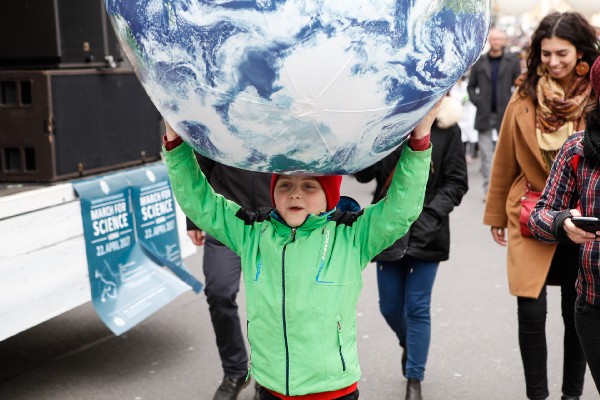
At left, a marcher carries a multipurpose sign showing that recent attacks on science are only the latest front in a long-running cultural and social war. Many participants at the Vienna March for Science brought their kids along, knowing how important science-based decisions on climate policy are for the future. (Photos: Jutta Strohmaier)
“My students are asking me if there is future for science. They’re not asking what the future is, and that frightens me,” said Northeastern University earth scientist Matthew Cohen, speaking to marchers in Sigmund Freud Park near the university. “This is a time when we need you to stand with us. My country is on the wrong track, and I’m frightened,” he said, referring to the toxic political climate in which the head of the Environmental Protection Agency denies the significance of greenhouse gases while the House Science Committeetweets fake climate news from a discredited website.
As the march wended through cobblestone streets, various other people joined the procession spontaneously, including the Weber family from Lower Austria, just finishing a visit to the Vienna Natural History Museum, which engages Austrians with an active citizen science program.

At Sigmund Freud Park in Vienna, the march included science games for kids. (Photo: Jutta Strohmaier)

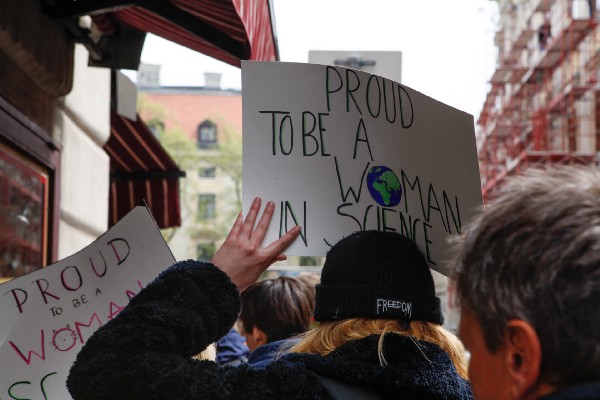
How many youngsters have become scientists because of their fascination with dinosaurs? At right, signs emphasizing gender show how the science marches are just one facet of a more fundamental cultural and social struggle that’s far from being resolved. (Photos: Jutta Strohmaier)
“This is the first I’ve ever been in a demonstration,” says Wolfgang Weber, a chemical engineer with a municipal water company. “But it seems like people are forgetting that science helps us live in comfort and keeps us healthy, especially our kids,” he says, nodding toward his 11-year-old son, who is reaching out to touch the dinosaur roaming through the crowd. “Politicians say whatever suits them, but that doesn’t make it right. Our decisions have to based on facts.”
As an example, he cites a recent science-based Austrian court decision to block construction of a new runway at the Vienna airport based on laws that, in turn, are based on scientific evidence that greenhouse gases are harming the environment.
Instead of developing transportation plans that acknowledge those facts, Austrian politicians have started to attack the court for its decision and want to introduce legislation that would limit the ability of courts to determine whether projects comply with environmental law.
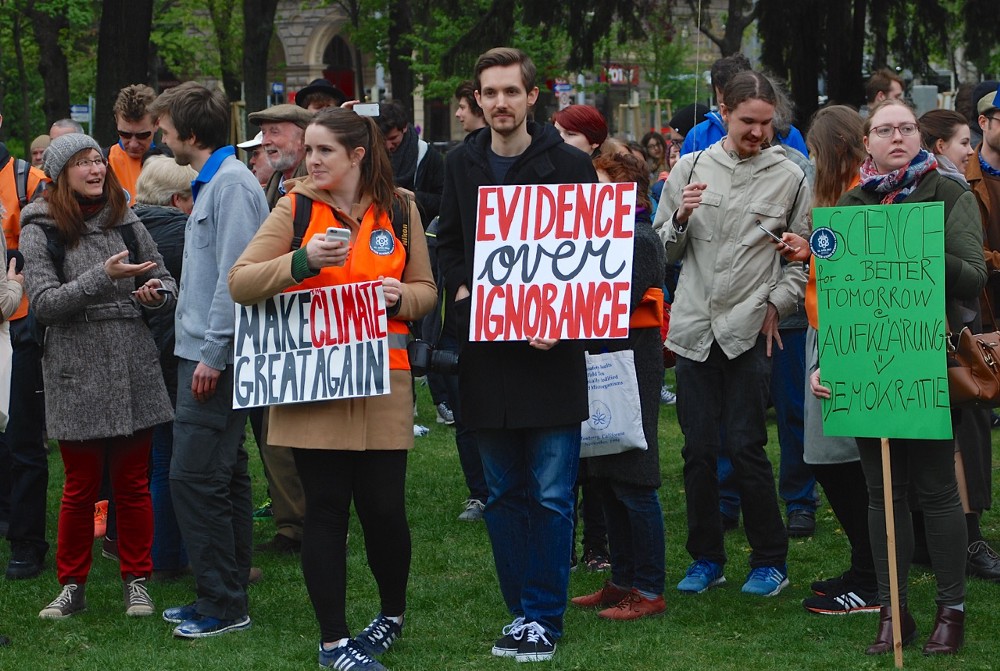
The message of science marches worldwide was consistent, emphasizing the importance of science to a functional democracy. (Photo: Bob Berwyn)
“So you see, the U.S. is not the only country where this is a problem. And look at Hungary, where Viktor Orbán is putting political officials in charge of universities because the professors are too independent, or Turkey, where scientists and teachers are being put in jail,” Weber says, adding that Russian President Vladimir Putin recently closed an independent university in St. Petersburg for the same reasons.
So far, no U.S. scientists have been jailed under President Donald Trump. But there’s plenty of precedent to show there is a serious threat, historically associated with conservative Republican administrations that tend to favor industry and business over environmental protection and public health.
That becomes clear with just a quick review of the past 30 years, starting, for example, when President Ronald Reagan’s administration cut environmental enforcement at the EPA and appointed public lands officials who halted efforts to protect forests and water quality. Under George W. Bush, politically appointed environmental officials overturned science-based management plans for public lands, quashed science on endangered species, and dismantled protection for Arctic wilderness areas.
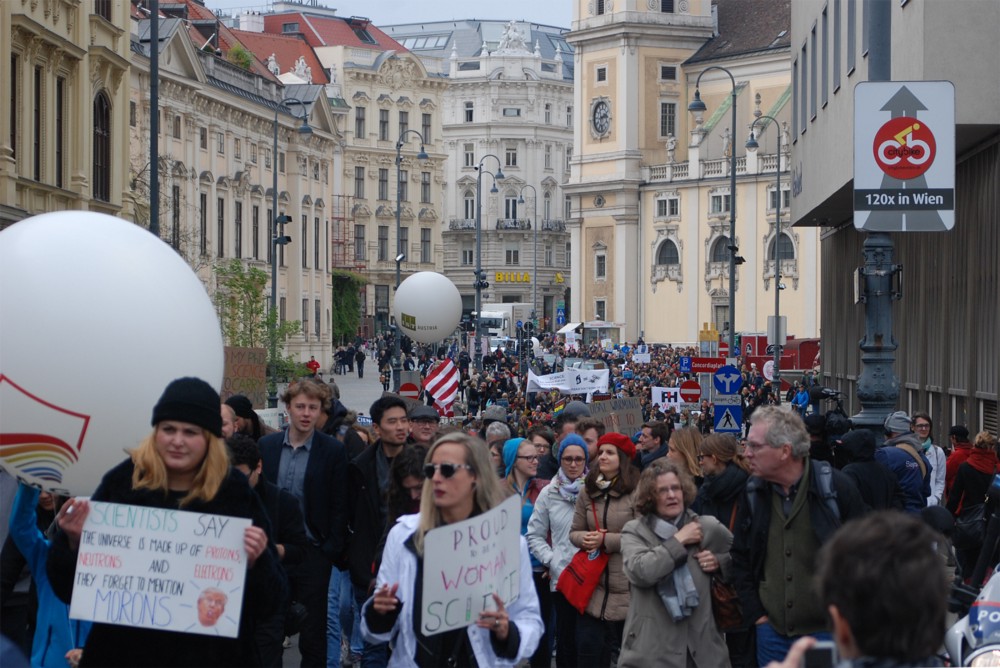
Thousands of marchers filled city streets during the April 22nd March for Science in Vienna. (Photo: Bob Berwyn)
But none of those past administrations was as overtly hostile to science and the environment as the current regime, and that scares neuroscientist Catherine McKenzie, an American doctoral student at the Vienna Institute of Science and Technology.*
“On November 9th, 2016, I woke up to a new government, one that represents principles so vastly different from my own that I felt shock. For the first time in my life I had the feeling that I didn’t want to go home. Home no longer felt safe,” McKenzie says, describing how her shock turned into resolve to take action.
“I was no longer going to sit on the sidelines and let policymakers create laws that I would have to live within but didn’t reflect my values. I am going to have a say in what matters to me. And so this, this is my first step off the bench and onto the playing field for science,” McKenzie said in a speech at the end of the march. “Science is about reason and logic and knowledge that makes our lives better but it’s also about passion and love and, in the end, the betterment of not only our species but that of the world we all share — and that is worth marching for.”
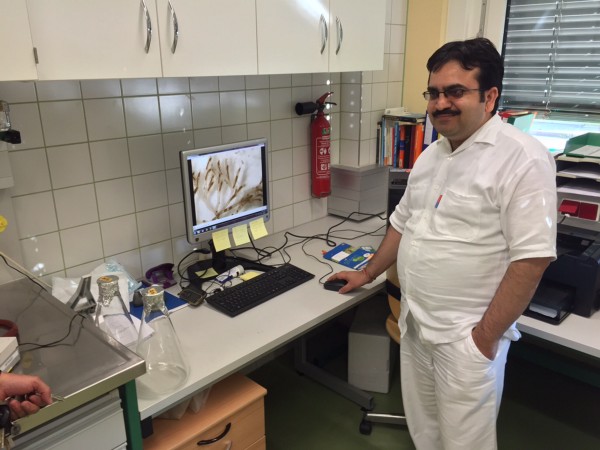
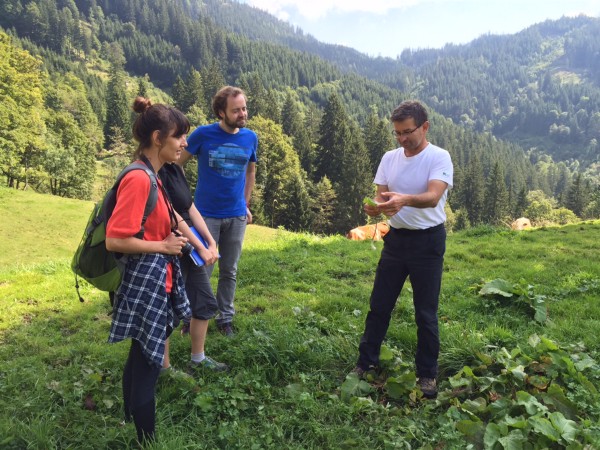
When they’re not protesting, scientists work to help us understand the world. At left, aquatic biologist Mansour Al-Matbouli tracks the life cycle of a parasite that is increasingly killing freshwater fish around the Northern Hemisphere as global temperatures warm. In the mountains of Austria, biogeochemist Andreas Böhner explains to graduate students how changing temperature and moisture is affecting vegetation in alpine pastures. (Photos: Bob Berwyn)
*Update—April 25, 2017: This article has been updated to reflect Catherine McKenzie’s area of expertise; it is neuroscience.





